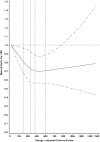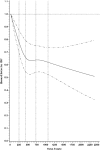Pre- and postfortification intake of folate and risk of colorectal cancer in a large prospective cohort study in the United States
- PMID: 21813806
- PMCID: PMC3173023
- DOI: 10.3945/ajcn.110.002659
Pre- and postfortification intake of folate and risk of colorectal cancer in a large prospective cohort study in the United States
Abstract
Background: A higher folate intake is associated with a decreased colorectal cancer risk in observational studies, but recent evidence suggests that excessive folate supplementation may increase colorectal cancer risk in some individuals. Therefore, mandatory folic acid fortification of grain products in the United States may have unintended negative consequences.
Objective: We examined the association between folate intake and colorectal cancer risk, including 8.5 y of postfortification follow-up.
Design: We examined the association between folate intake and colorectal cancer in the NIH-AARP Diet and Health Study-a US cohort study of 525,488 individuals aged 50-71 y initiated in 1995-1996. Dietary, supplemental, and total folate intakes were calculated for the pre- and postfortification periods (before and after 1 July 1997) based on a baseline food-frequency questionnaire. HRs and 95% CIs were calculated by using multivariable Cox proportional hazards regression models.
Results: During follow-up through 31 December 2006 (mean follow-up: 9.1 y), 7212 incident colorectal cancer cases were identified. In the postfortification analysis (6484 cases), a higher total folate intake was associated with a decreased colorectal cancer risk (HR for ≥900 compared with <200 μg/d: 0.70; 95% CI: 0.58, 0.84). The highest intakes specifically from supplements (HR: 0.82; 95% CI: 0.72, 0.92) or from diet (HR: 0.81; 95% CI: 0.67, 0.97) were also protective. The pattern of associations was similar for the prefortification period, and no significant differences between time periods were observed.
Conclusions: In this large prospective cohort study that included 8.5 y of postfortification follow-up, folate intake was associated with a decreased colorectal cancer risk. Given that the adenoma-carcinoma sequence may take ≥10 y, additional follow-up time is needed to fully examine the effect of folic acid fortification.
Figures


Comment in
-
Folate consumption and cancer risk: a confirmation and some reassurance, but we're not out of the woods quite yet.Am J Clin Nutr. 2011 Oct;94(4):965-6. doi: 10.3945/ajcn.111.023796. Epub 2011 Sep 7. Am J Clin Nutr. 2011. PMID: 21900462 Free PMC article. No abstract available.
Similar articles
-
Association of folate intake and colorectal cancer risk in the postfortification era in US women.Am J Clin Nutr. 2021 Jul 1;114(1):49-58. doi: 10.1093/ajcn/nqab035. Am J Clin Nutr. 2021. PMID: 33742202 Free PMC article.
-
B vitamin intakes and incidence of colorectal cancer: results from the Women's Health Initiative Observational Study cohort.Am J Clin Nutr. 2013 Feb;97(2):332-43. doi: 10.3945/ajcn.112.034736. Epub 2012 Dec 19. Am J Clin Nutr. 2013. PMID: 23255571 Free PMC article.
-
High levels of folate from supplements and fortification are not associated with increased risk of colorectal cancer.Gastroenterology. 2011 Jul;141(1):98-105, 105.e1. doi: 10.1053/j.gastro.2011.04.004. Epub 2011 Apr 14. Gastroenterology. 2011. PMID: 21586288
-
Folate intake and the risk of colorectal cancer: a systematic review and meta-analysis.Cancer Epidemiol. 2011 Feb;35(1):2-10. doi: 10.1016/j.canep.2010.11.004. Epub 2010 Dec 21. Cancer Epidemiol. 2011. PMID: 21177150 Review.
-
Response of red blood cell folate to intervention: implications for folate recommendations for the prevention of neural tube defects.Am J Clin Nutr. 2000 May;71(5 Suppl):1308S-11S. doi: 10.1093/ajcn/71.5.1308s. Am J Clin Nutr. 2000. PMID: 10799407 Review.
Cited by
-
Whole grain and dietary fiber intake and risk of colorectal cancer in the NIH-AARP Diet and Health Study cohort.Am J Clin Nutr. 2020 Sep 1;112(3):603-612. doi: 10.1093/ajcn/nqaa161. Am J Clin Nutr. 2020. PMID: 32619213 Free PMC article.
-
Association of folate intake and colorectal cancer risk in the postfortification era in US women.Am J Clin Nutr. 2021 Jul 1;114(1):49-58. doi: 10.1093/ajcn/nqab035. Am J Clin Nutr. 2021. PMID: 33742202 Free PMC article.
-
MR1-dependence of unmetabolized folic acid side-effects.Front Immunol. 2022 Aug 9;13:946713. doi: 10.3389/fimmu.2022.946713. eCollection 2022. Front Immunol. 2022. PMID: 36016938 Free PMC article.
-
Folic Acid Supplement Intake and Risk of Colorectal Cancer in Women; A Case Control Study.Ann Glob Health. 2020 Feb 27;86(1):23. doi: 10.5334/aogh.2664. Ann Glob Health. 2020. PMID: 32140432 Free PMC article.
-
Folates, folic acid and preconception care - a review.JRSM Open. 2021 May 13;12(5):2054270420980875. doi: 10.1177/2054270420980875. eCollection 2021 May. JRSM Open. 2021. PMID: 34035929 Free PMC article. Review.
References
-
- Choi SW, Mason JB. Folate and carcinogenesis: an integrated scheme. J Nutr 2000;130:129–32 - PubMed
-
- Kim YI. Folate and carcinogenesis: evidence, mechanisms, and implications. J Nutr Biochem 1999;10(2):66–88 - PubMed
-
- Zingg JM, Jones PA. Genetic and epigenetic aspects of DNA methylation on genome expression, evolution, mutation and carcinogenesis. Carcinogenesis 1997;18:869–82 - PubMed
-
- Kim YI. Folate and colorectal cancer: an evidence-based critical review. Mol Nutr Food Res 2007;51:267–92 - PubMed
-
- World Cancer Research Fund/American Institute for Cancer Research Food, nutrition, physical activity and the prevention of cancer: a global perspective. Washington, DC: AICR, 2007
Publication types
MeSH terms
Substances
Grants and funding
LinkOut - more resources
Full Text Sources
Medical

